If you’re interested in owning a Good Fuzzy Sounds pedal, you might want to see how my work has evolved through this list of old builds.
I started making pedals in 2001, influenced by forums like diystompboxes and experimentalistsanonymous, and sites run by RG Keen, Tim Escobedo and John Lyons.
By chance I’d bought a rare Marshall Supa Fuzz for £6 in the 1980s, but I didn’t really get engrossed in vintage pedals and circuits until the late 2000s when I joined David Main’s D*A*M forum.
This isn’t everything I’ve built, but everything I’ve kept. Some boxes have housed different circuits over the years, some were cannibalised for switches or pots, some broke, some sold, some lost.
Monatron (1997)
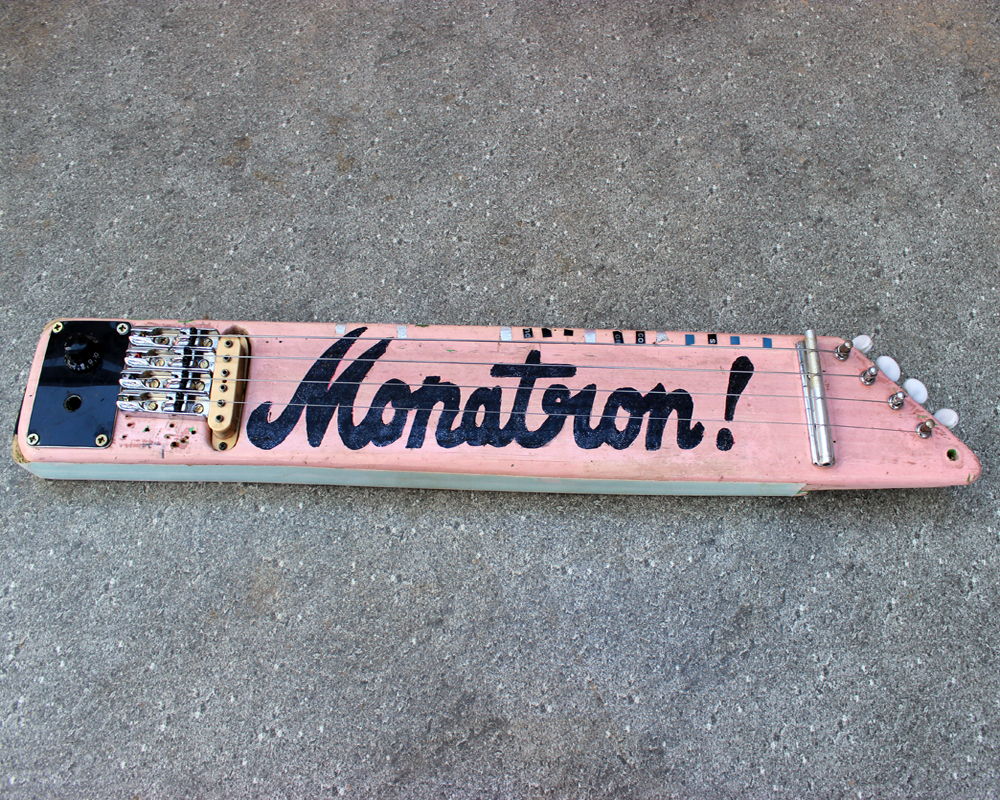
I built my first instrument in 1997, inspired by Alvin Lucier, the Velvet Underground Ostrich guitar and the Glenn Branca power drone, with all strings tuned to E. I wanted to incorporate it into my car crash dragcore band Six inch Killaz, but that didn’t work out. I did a few solo gigs and recordings with it, playing it violin-style with a pipe and through the Supa Fuzz.
First pedals
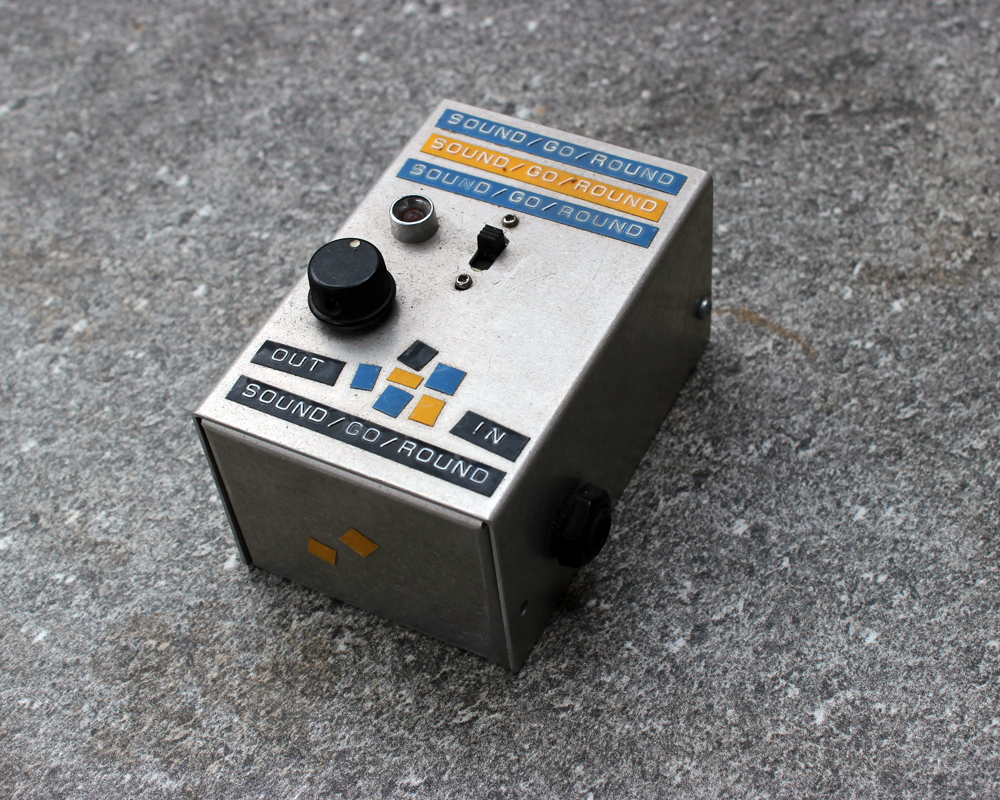
Sound-Go-Round
My first electronic project was a re-housed primitive choppy tremolo made by Walco in the 1970s. Also: Dymo tape arrives.
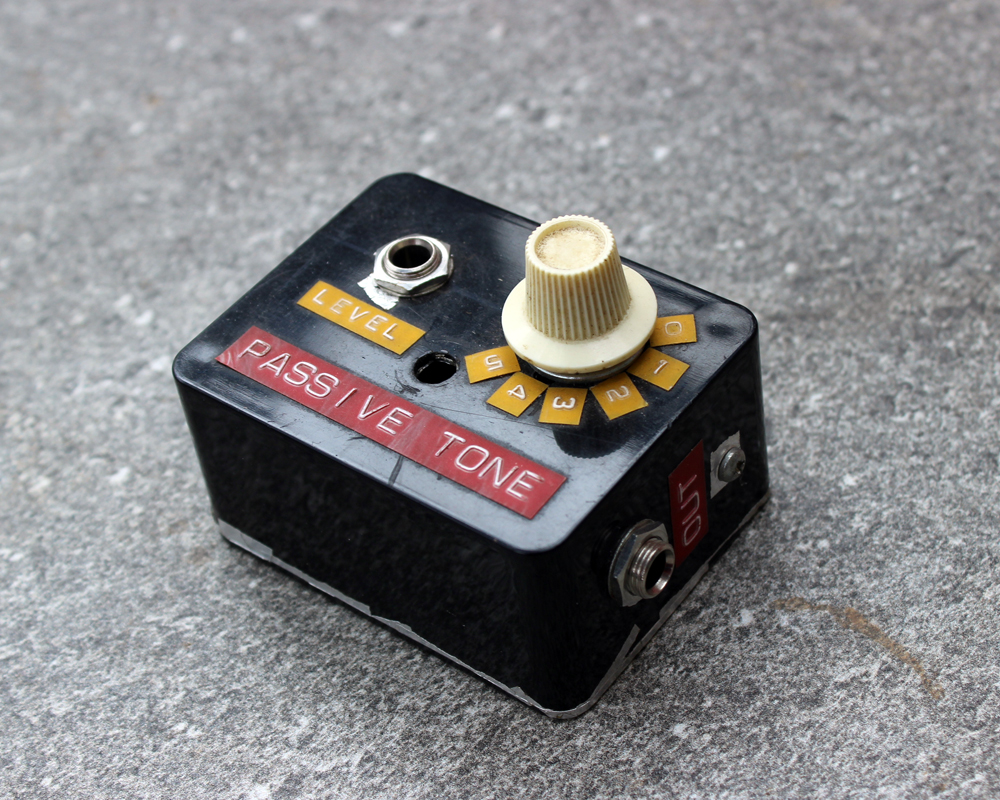
Passive Tone Control
A tone control with a variable range. The first project in Craig Anderton’s Electronic Projects for Musicians (or EPFM). I later changed it to a low pass filter (bass cut) to use with my dark Selmer amp.
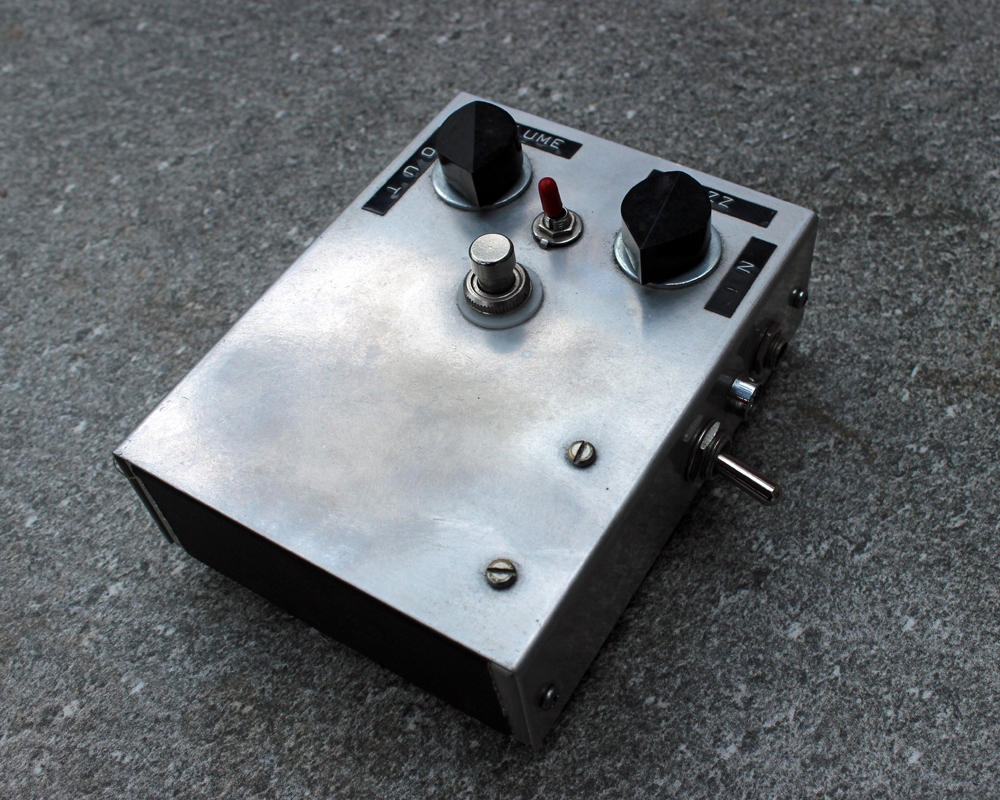
Tube Sound Fuzz
My first proper DIY pedal was another EPFM thing. I sent off for a kit from PAIA Electronics. Not really a fuzz but works good at low settings as an overdrive. I also built the Anderton Ring Modulator, but it broke and I used the box for something else.
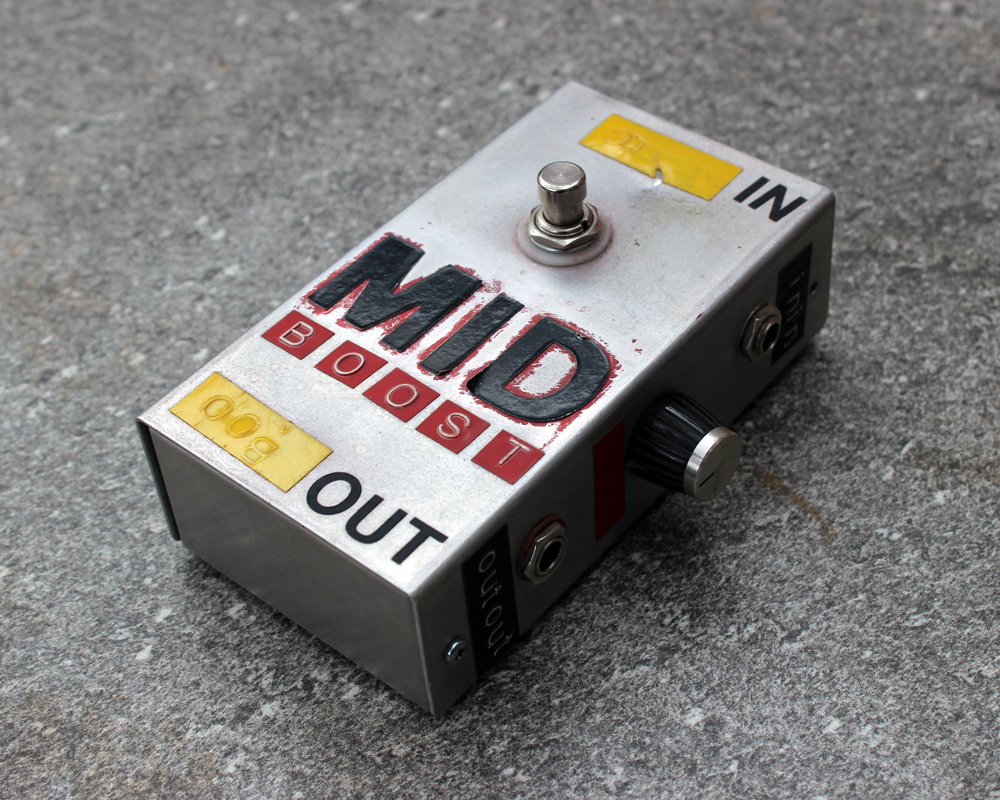
Mid-Boost
This was one of a few varieties of Rangemaster based boosts I built, based on info from RG Keen’s geofex website. My first germanium pedal and the first appearance of cheapo Maplins boxes.
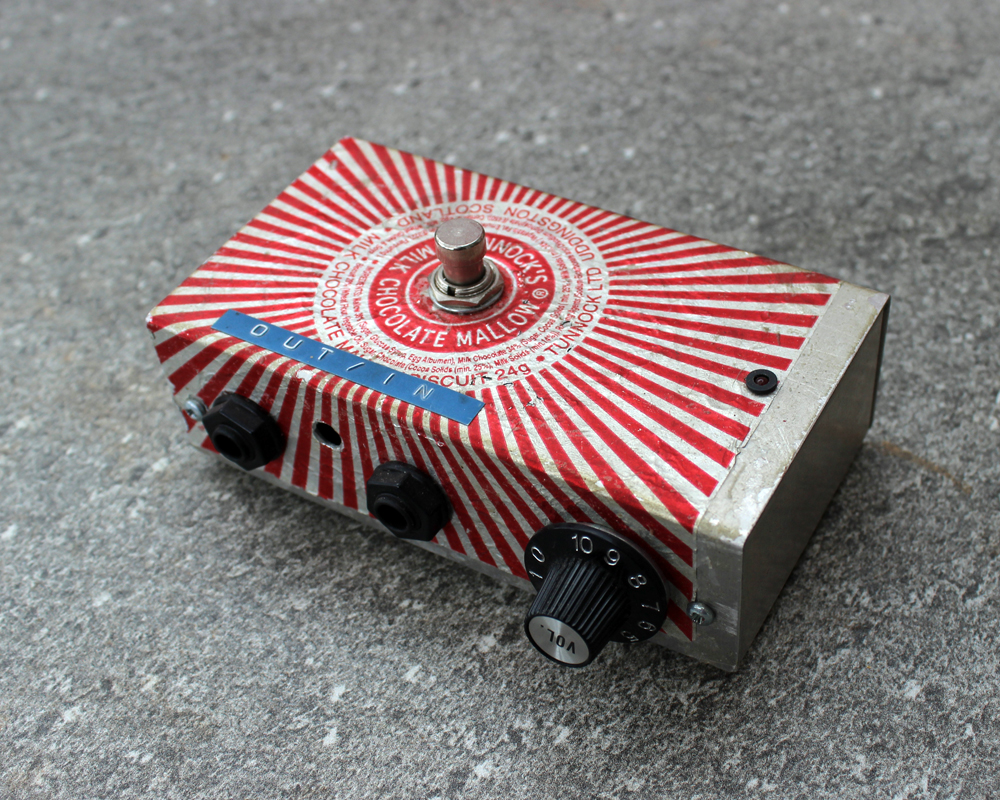
Tunnocks Distortion Booster
Based on the Vox 8162 circuit. I tried a few flavours of this one too.
Searching for sounds
I made a lot of basic fuzzes from layouts at diystompboxes and things from Tim Escobedo’s Folk Urban website around this time. Simple circuits with lots of different sounds and easy to find parts suited me best.
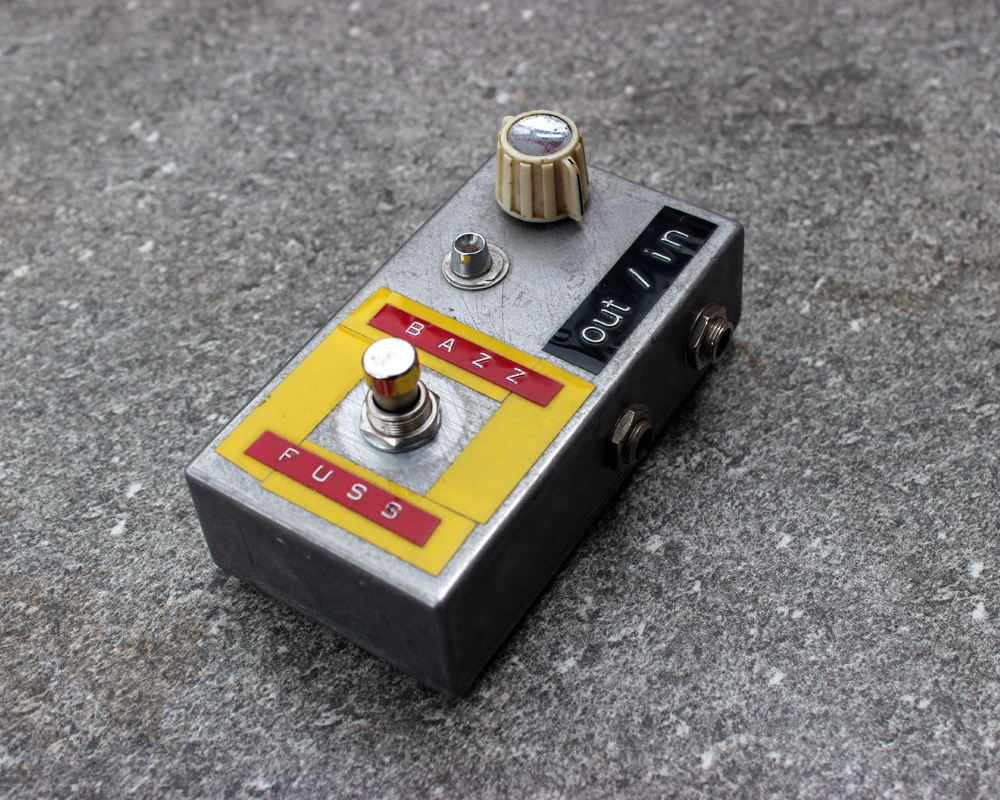
Bazz Fuzz
The all-time classic DIY fuzz, designed by a Finnish anticapitalist called Hemmo P around 2000.
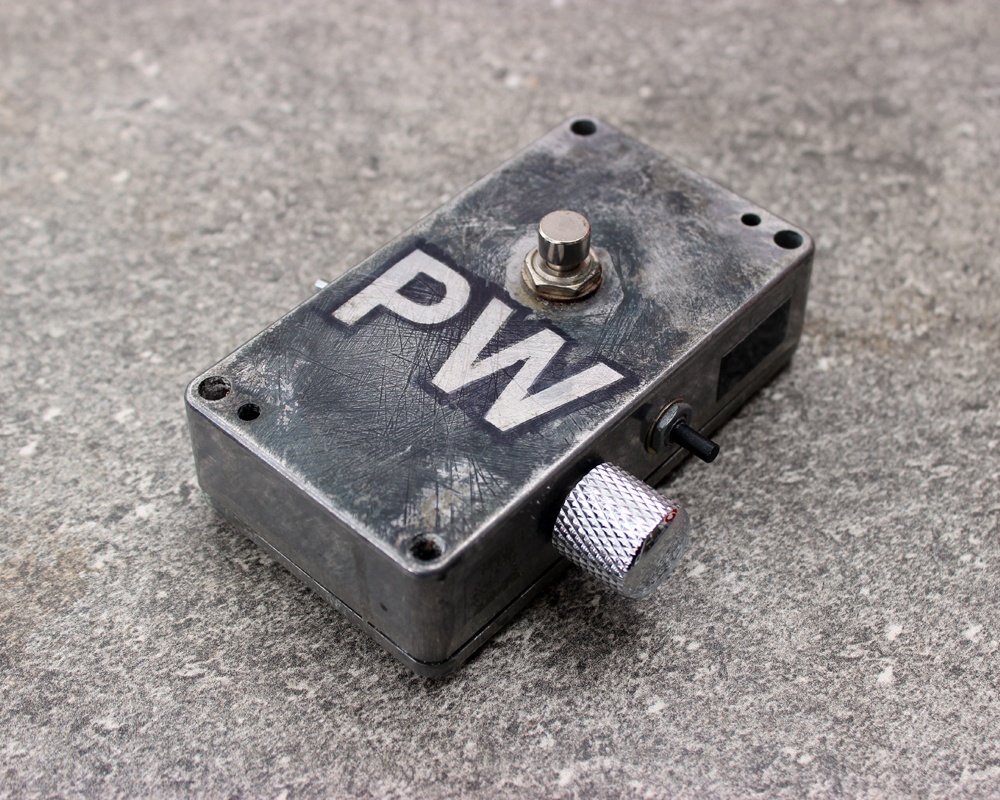
PWM
A simple pulse width modulator circuit similar to one in a synth, adapted for guitar by Tim E. This is really fun and sounds amazing but isn’t very practical unless you’re in Hawkwind.
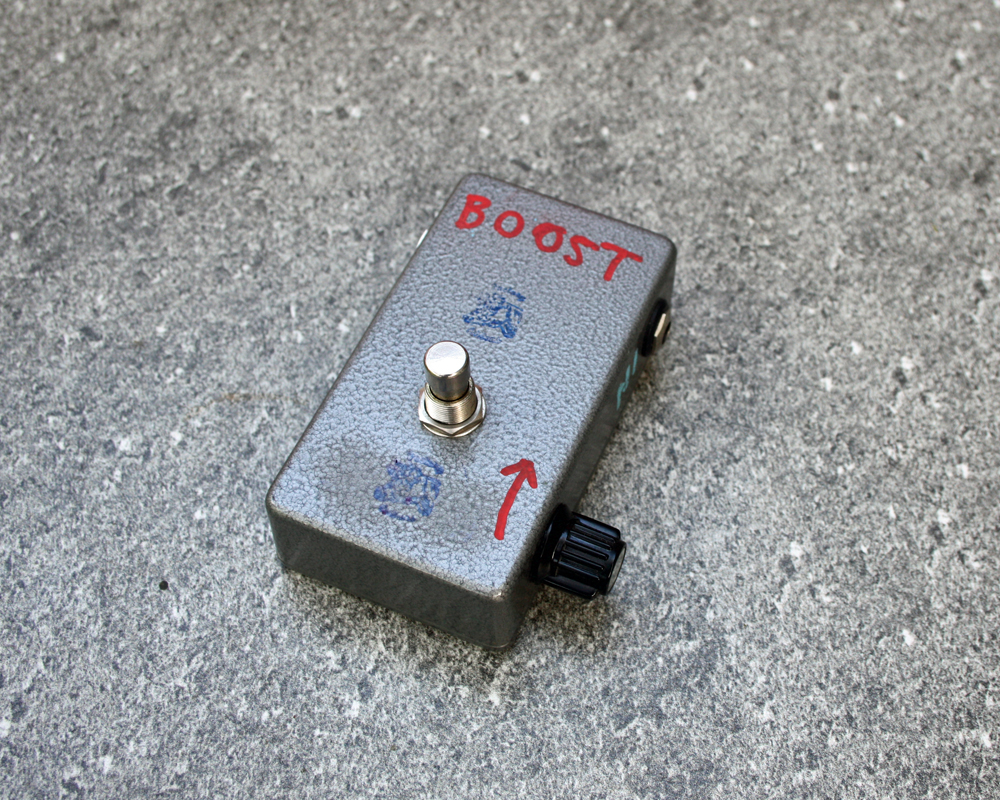
SHO
Another DIY rite-of-passage pedal, credited to Z Vex, but actually designed collaboratively on the diystompboxes forum by him and others. Kind of boosts and thickens up the guitar sound. In the 2000s everyone built this and the Z Vex Fuzz Factory.
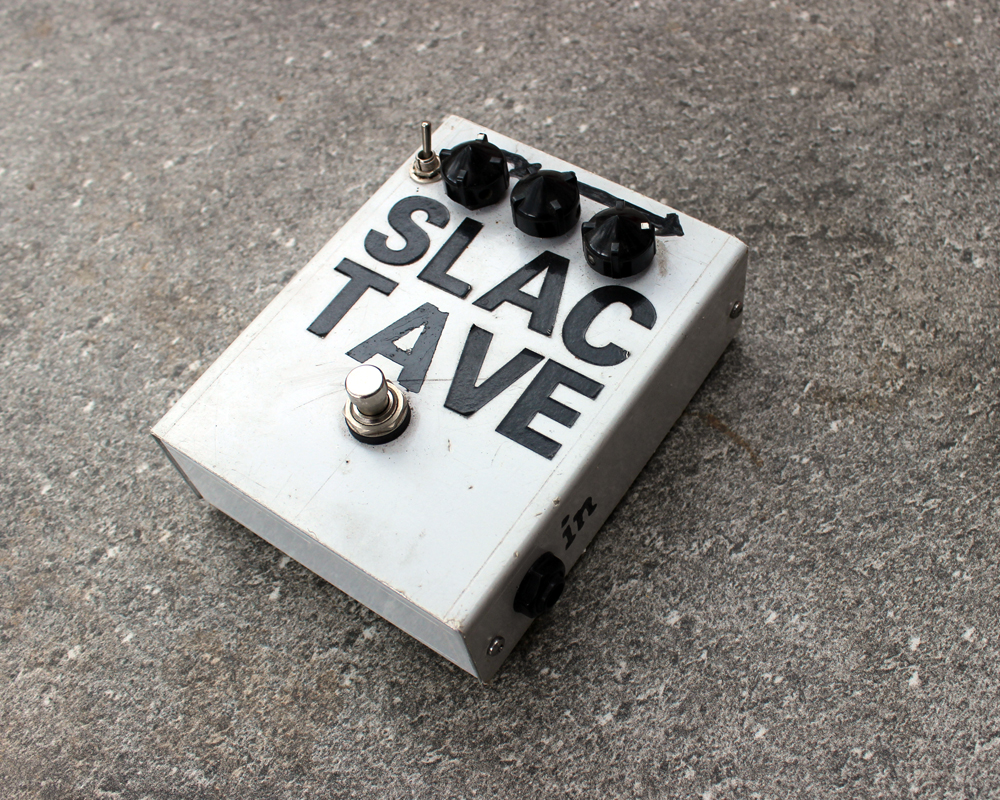
Slactave
A sort of glitchy octave-down fuzz, designed by Slacker from the diystompboxes forum. I think I kept it just for the box.
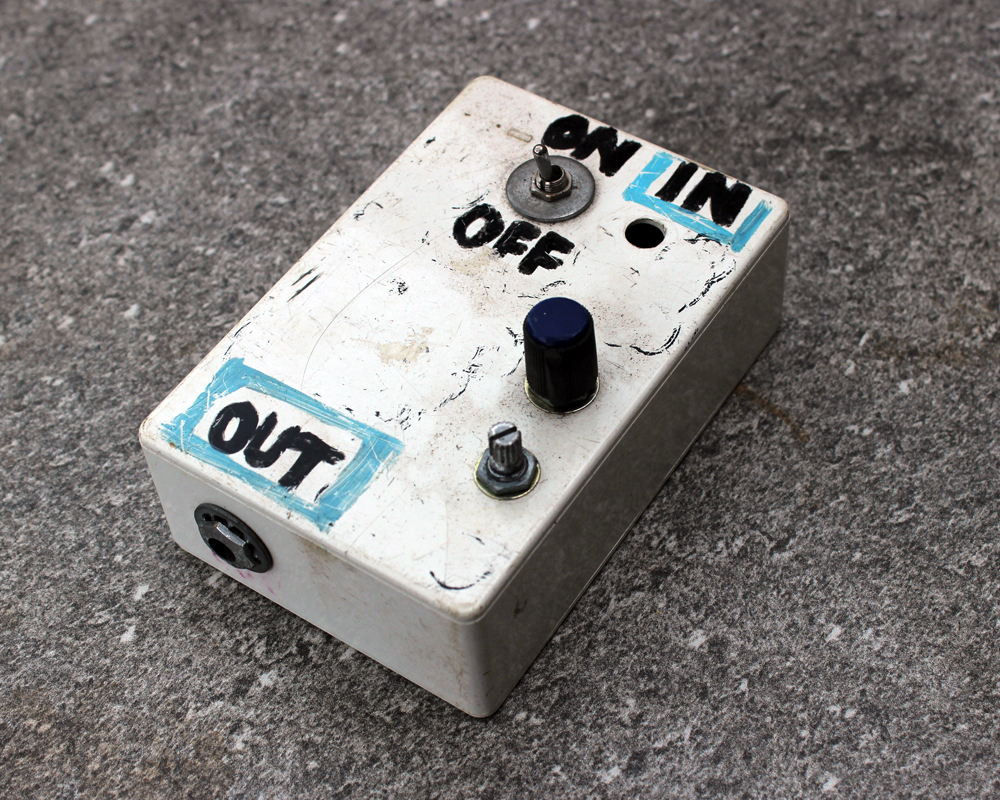
Thing Modulator
Another Escobedo mini-classic, with his Tytewad fuzz tacked on the end for more volume. I used this later on with the A-Band quite a lot.
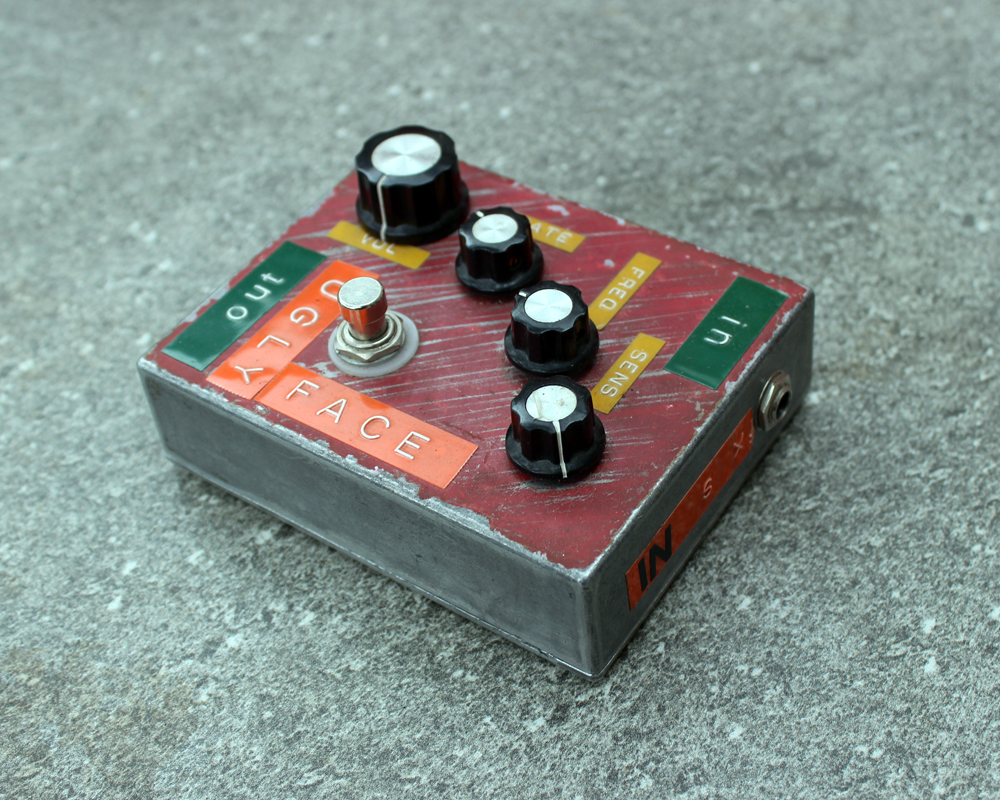
Ugly Face
A more complex Escobedo circuit, it took a while to get it to work but I got there in the end. Very ‘out there’ sounds but also usable. Hear it on the Chubsters theme song I wrote and A-Band live tapes.

Murphy
A modified Morley DS-1, a mostly unloved distortion pedal from about 1980. I changed the op-amp and added a tone control. Years later I got some self adhesive letters and, by pure coincidence, they were the same font, same size and Morley and Murphy have the same number of letters!
Building from scratch
I started to do my own layouts and modified circuits to my own tastes.
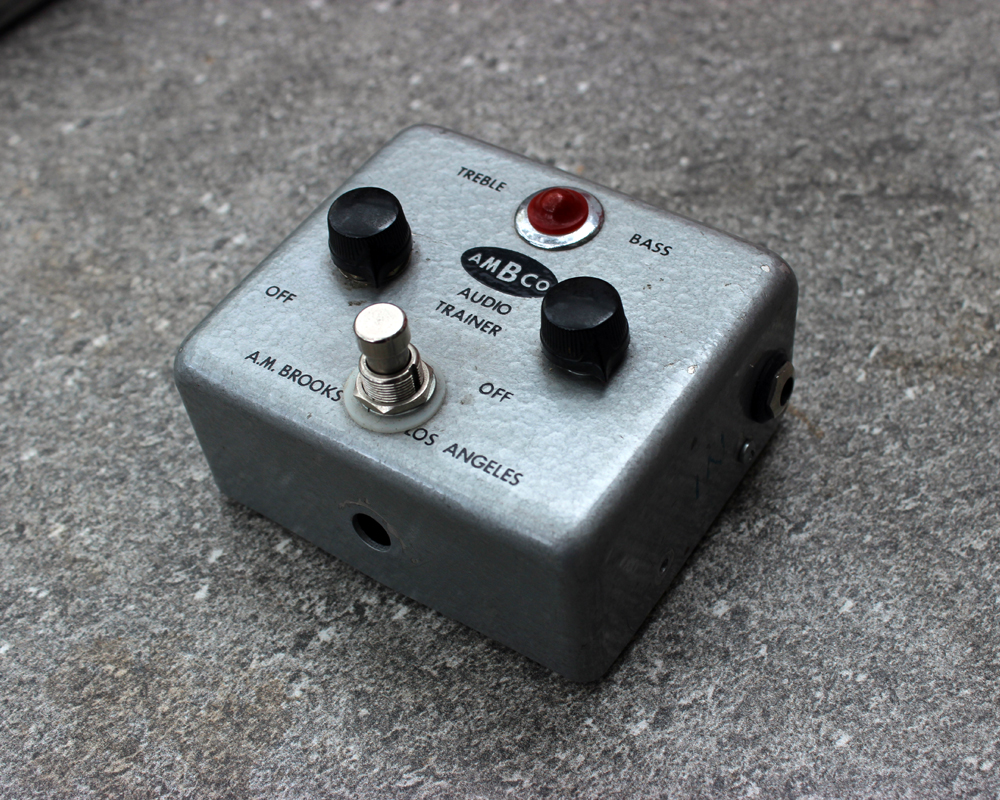
The Optimum Fuzz Adapter
An early design by Craig Anderton of EPFM fame. His caption to the original published schematic says “Triggered square wave output of op-amp provides good fuzzy sounds.” Hooray! The enclosure is from some kind of medical hearing sensitivity tester.
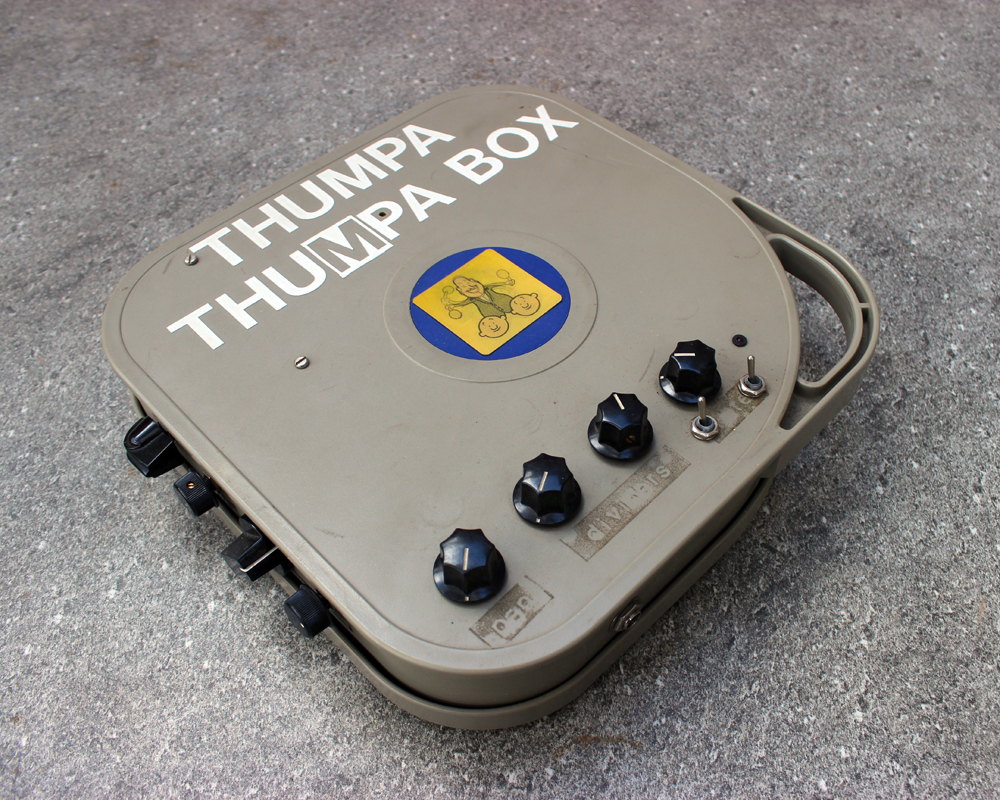
Thumpa Thumpa Box
A classic of ‘doesn’t-quite-live-up-to-the-description’ hobby mag circuit. It’s a rhythm box sort of thing, but does not sound like electronic bongos. The enclosure for this is a 1” video tape box.
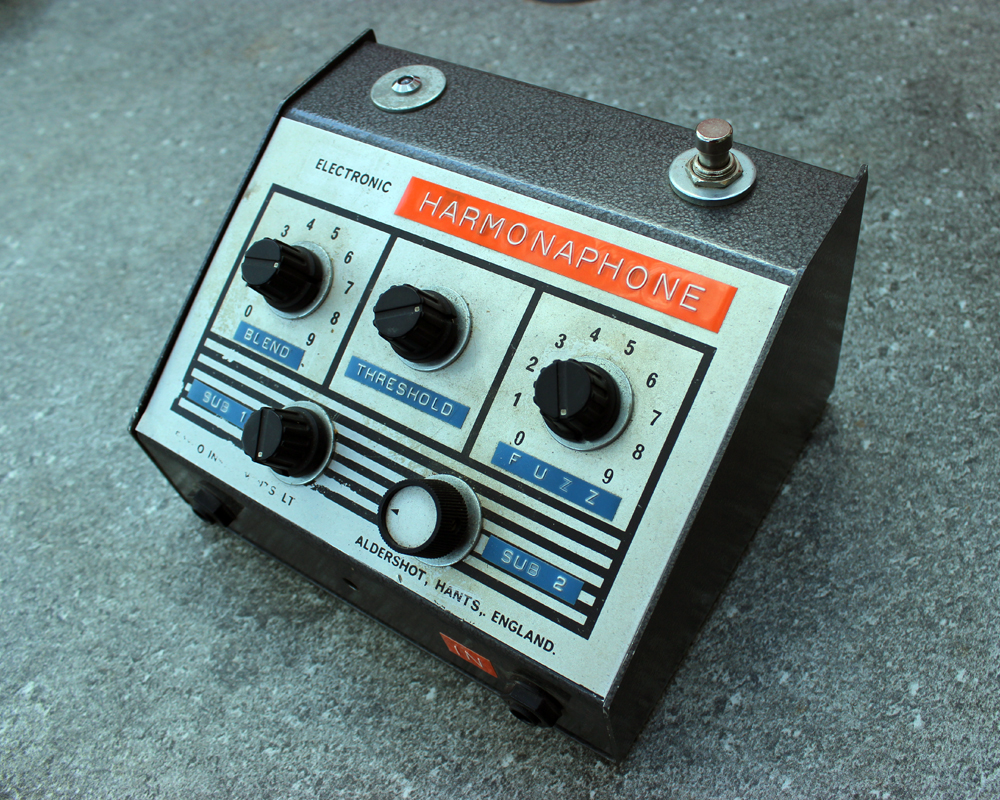
Harmonaphone
This is a monster hobby mag fuzz with seven transistors. It doesn’t sound as amazing as it should but I do like it. I got John Lyons of Basic Audio to make me a PCB.
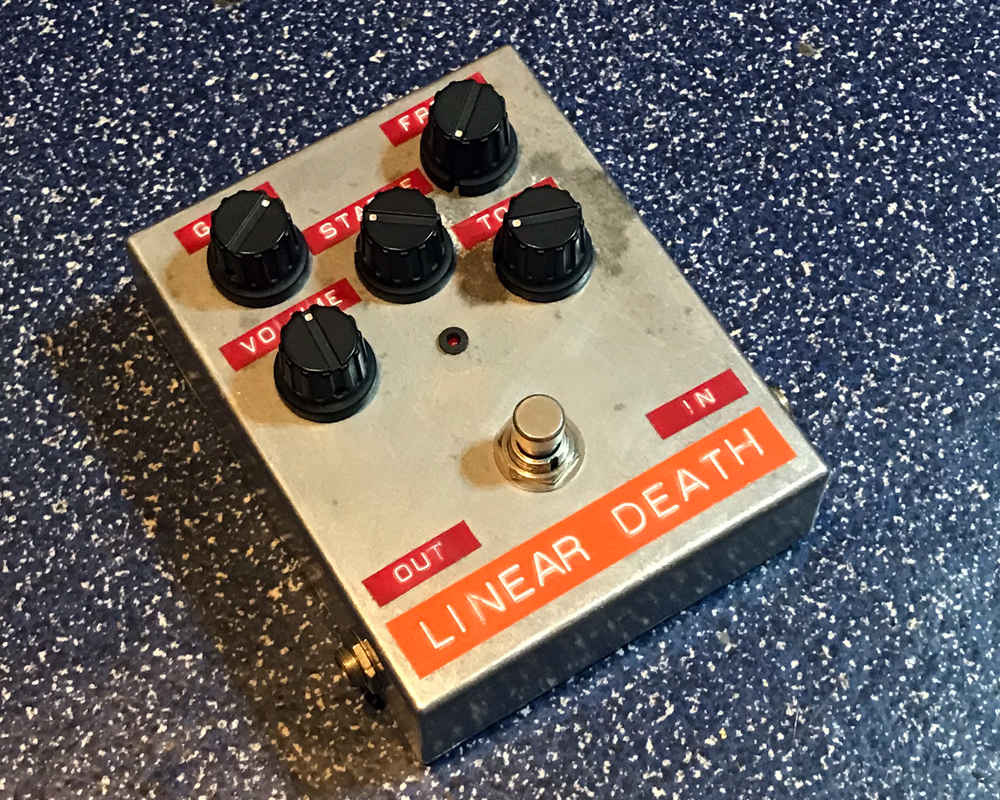
Linear Death
I made this for my dear friend Kaoru, who had just started a band called Deathline. It’s based on the Experimentalists Anonymous Parallel Universe, and she still uses it in her current band The Dead Zoo.
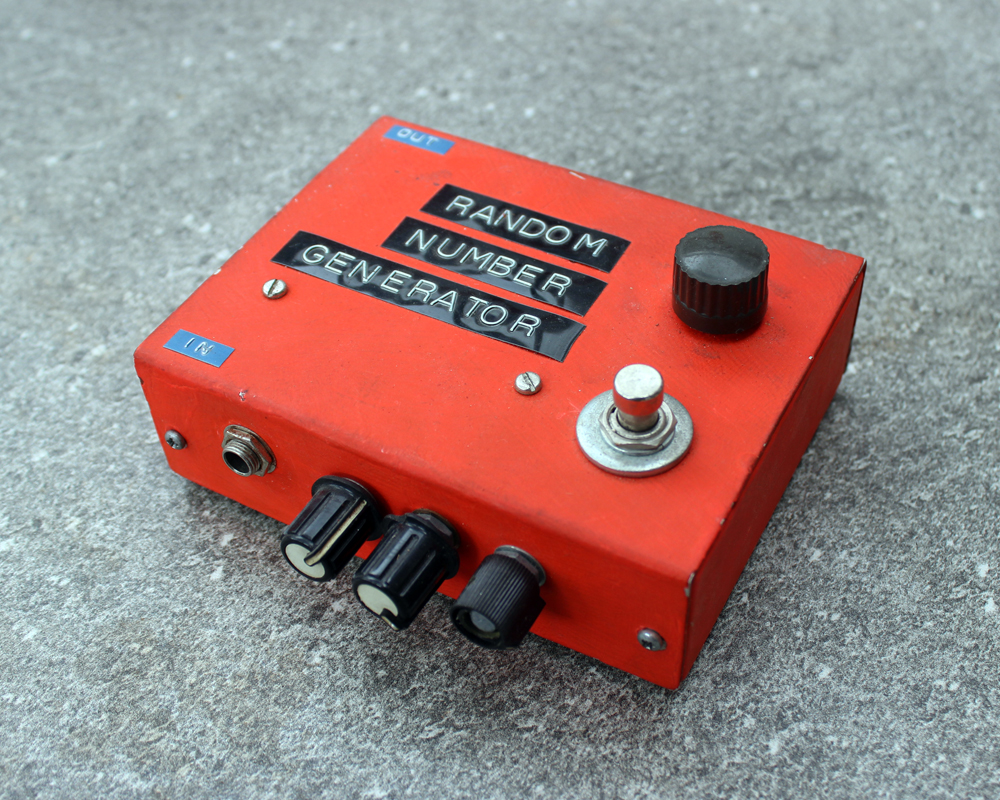
Random Number Generator
Doug Deeper’s Mid-Fi Electronics was another big early influence. He shared ideas and schematics online and I made a few of his pedals, like the Freakout Fuzz, Peace Gun and this one, the Random Number Generator, a wild tweakable four silicon transistor fuzz.
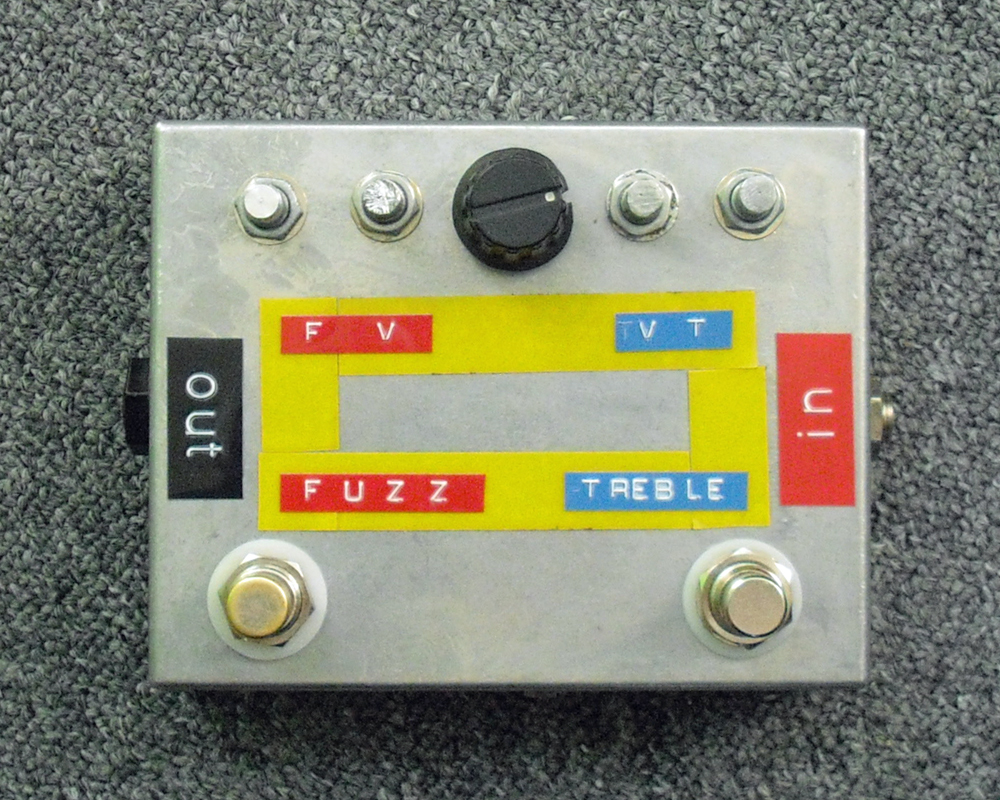
Fuzz + Treble Boost
This was custom order from Kieran from the Ceramic Hobs, who played with the A-Band a few times around 2010. I can’t remember what circuits I used but it looks nice. Kieran died but hopefully the pedal is still being used somewhere.
Getting Weirder
My main musical outlet in the late 2000s was the A-Band, so I made more weird noise things.
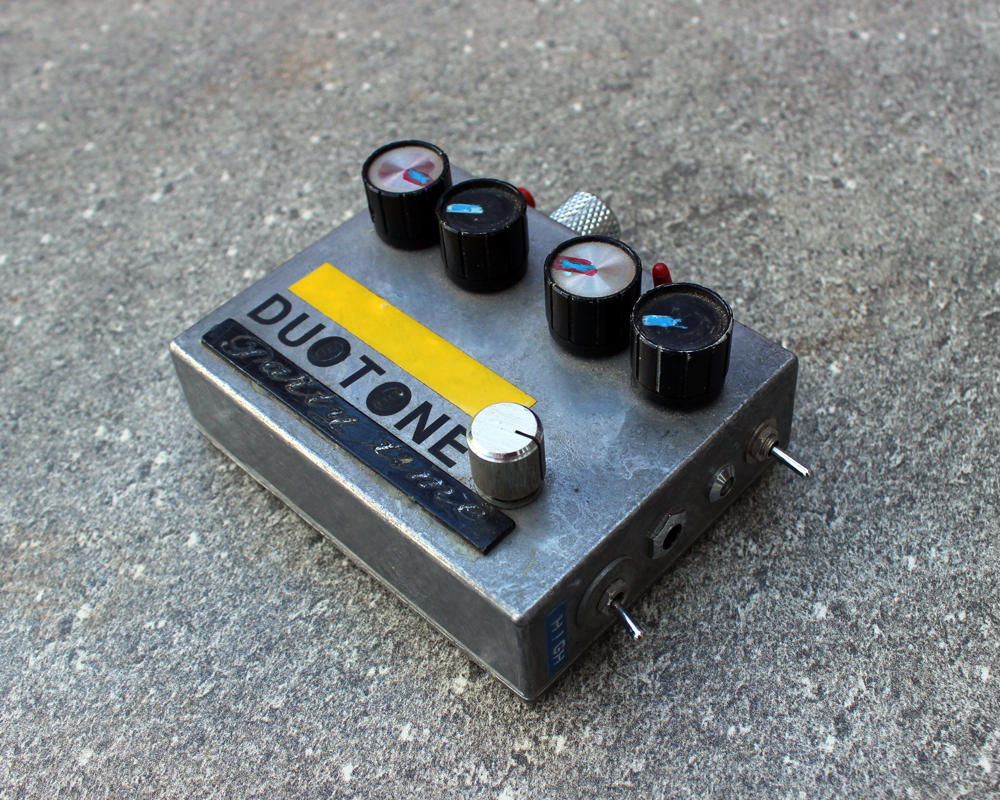
Duo Tone Party Time
A revelation, from a scrappy line drawing on the internet, credited only to Christian. Just a 40106 chip and a few capacitors and pots but I love it. I’ve used this consistently for years because it’s really versatile, it can be almost conventionally musical, but also much more.
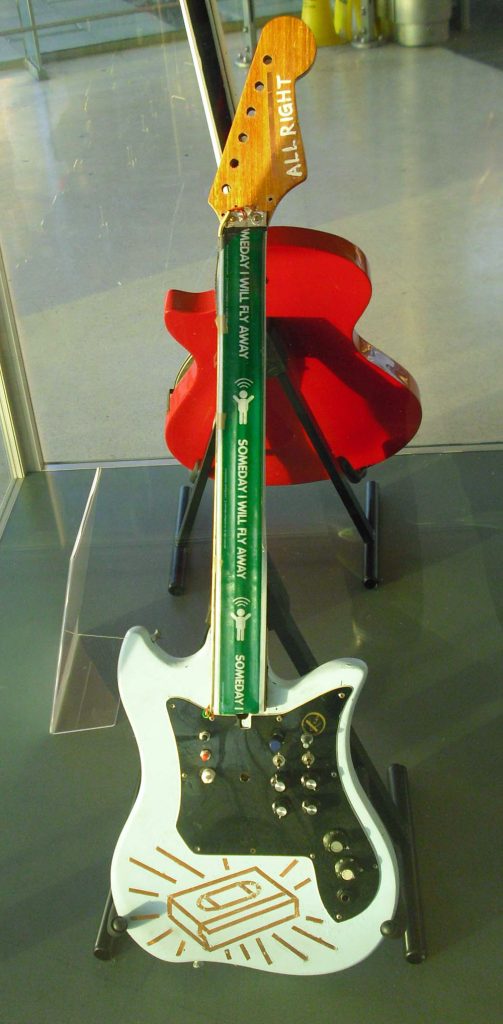
All Right videotape oscillator guitar
Inspired by Tim Escobedo’s Synth Stick, it used a particular type of conductive video tape to control the pitch of two oscillators (similar to the ones in the Duo Tone Party Time). It’s built on the body and neck of a Kay guitar that I played in Six Inch Killaz that cost £7. I used this with the A-Band quite a bit but it became unusable after a while. Currently in pieces.
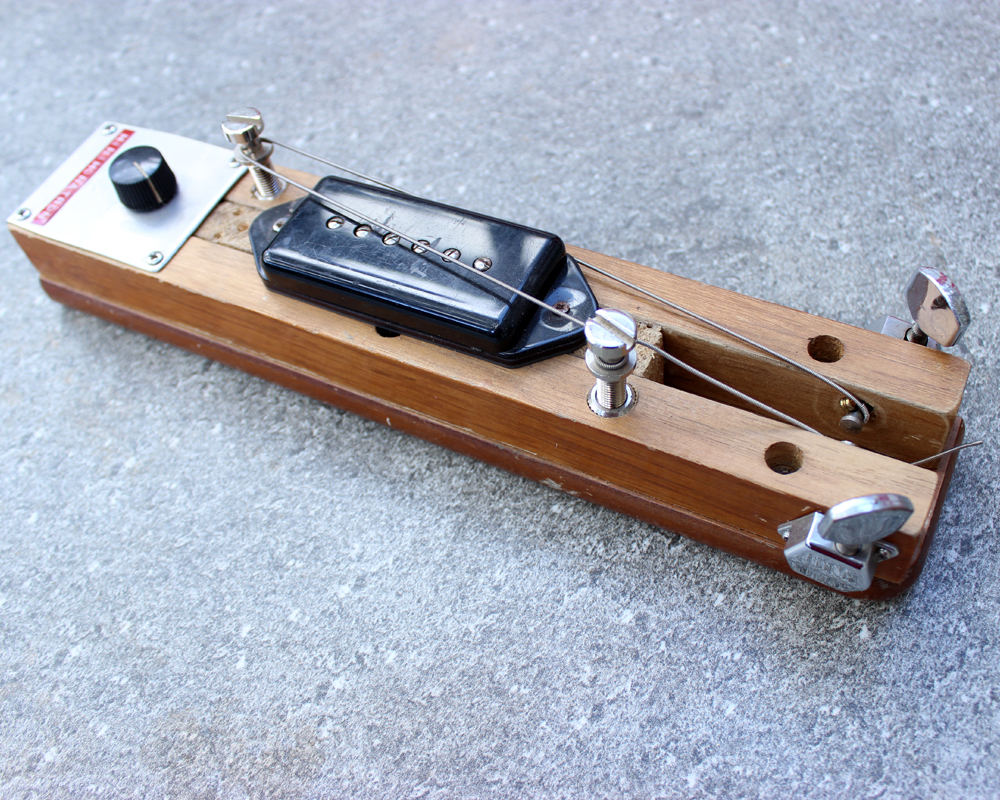
Mini Monatron
Conceived as a small portable thing with one guitar string and pickup, specifically for the A-Band, usually played through the Ugly Face and/or Thing Modulator.
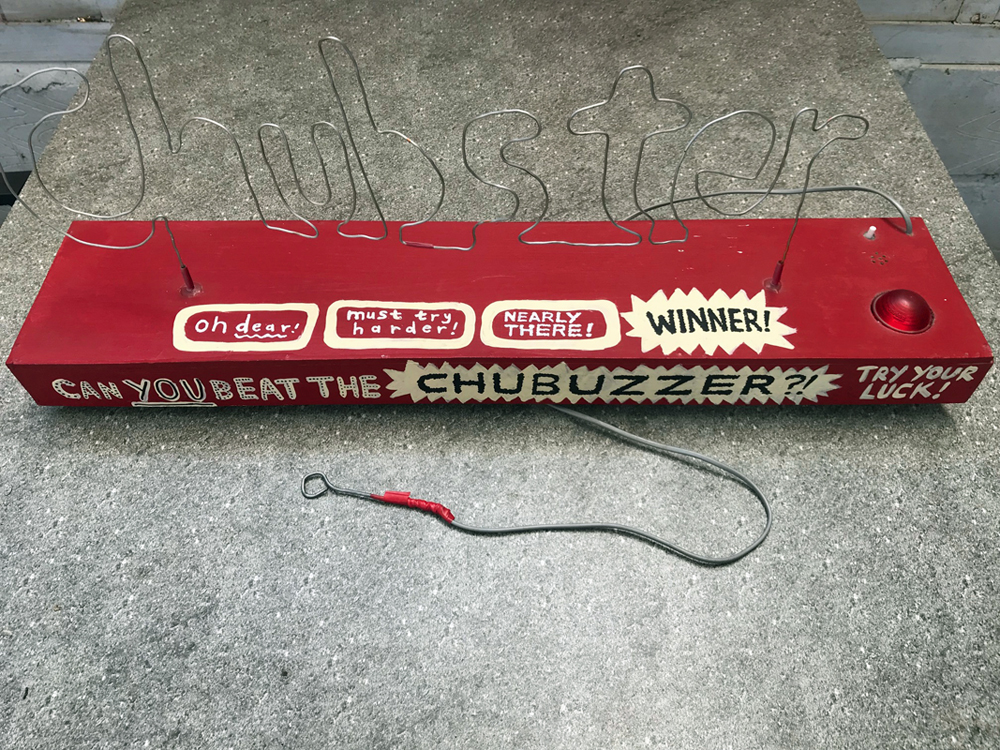
Chubuzzer
I made this fiendishly difficult game for The Fat of the Land, a queer chub harvest festival that took place in London in 2009. One person beat it multiple time and won all the Tunnocks Tea Cake prizes.
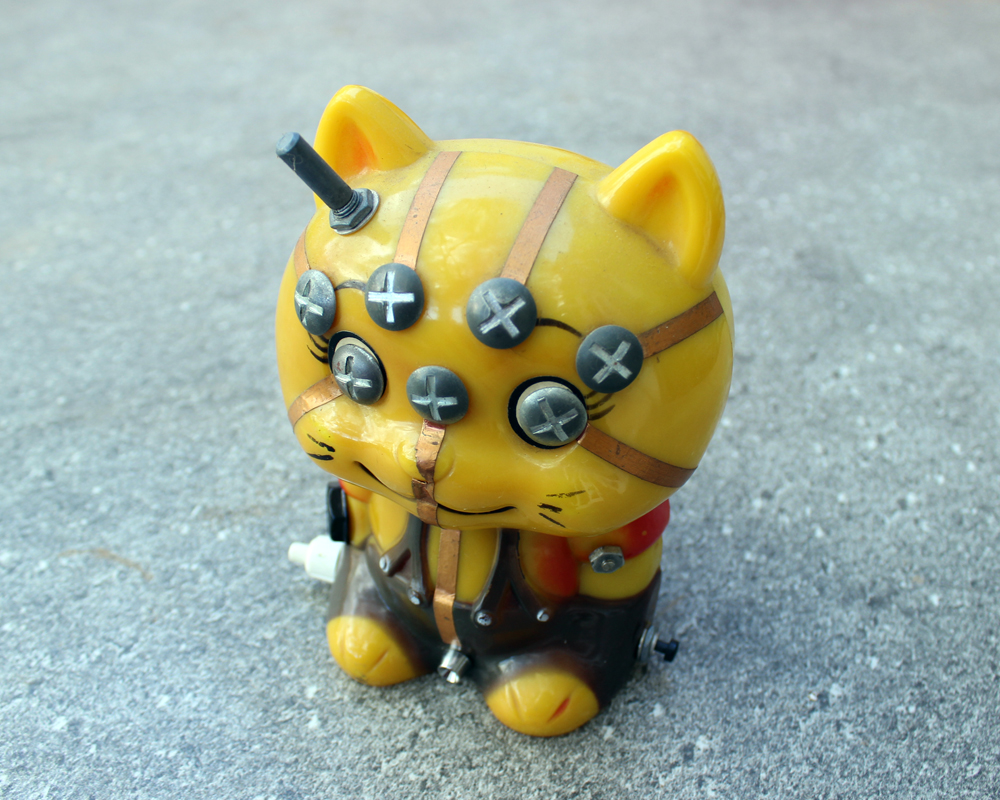
Cracklepuss
A STEIM kraakdoos/Cracklebox circuit built into a transistor radio case shaped like a cat. Quite difficult to play, but interesting. Another A-Band fave.
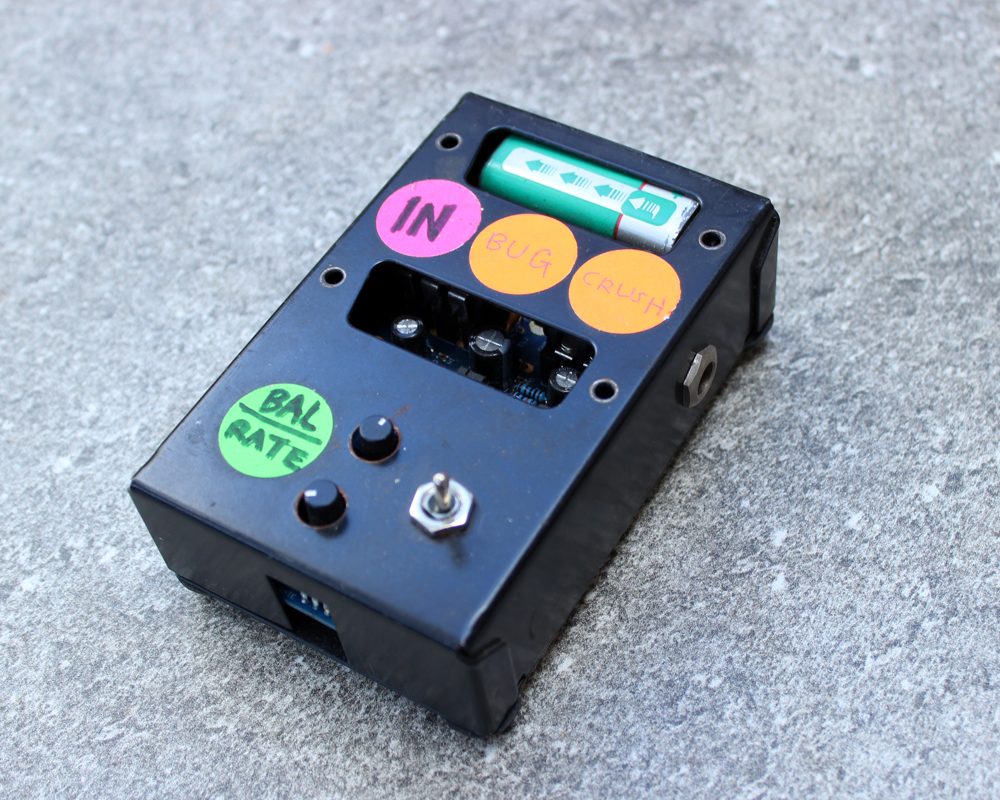
BugCrusher
From BugBrand, a small company in Bristol. Tom makes really beautiful synth modules and other stuff I don’t understand, but also used to do smaller things in kit form like the BugCrusher, a digital bit-rate reducer which is kind of like digital fuzz.
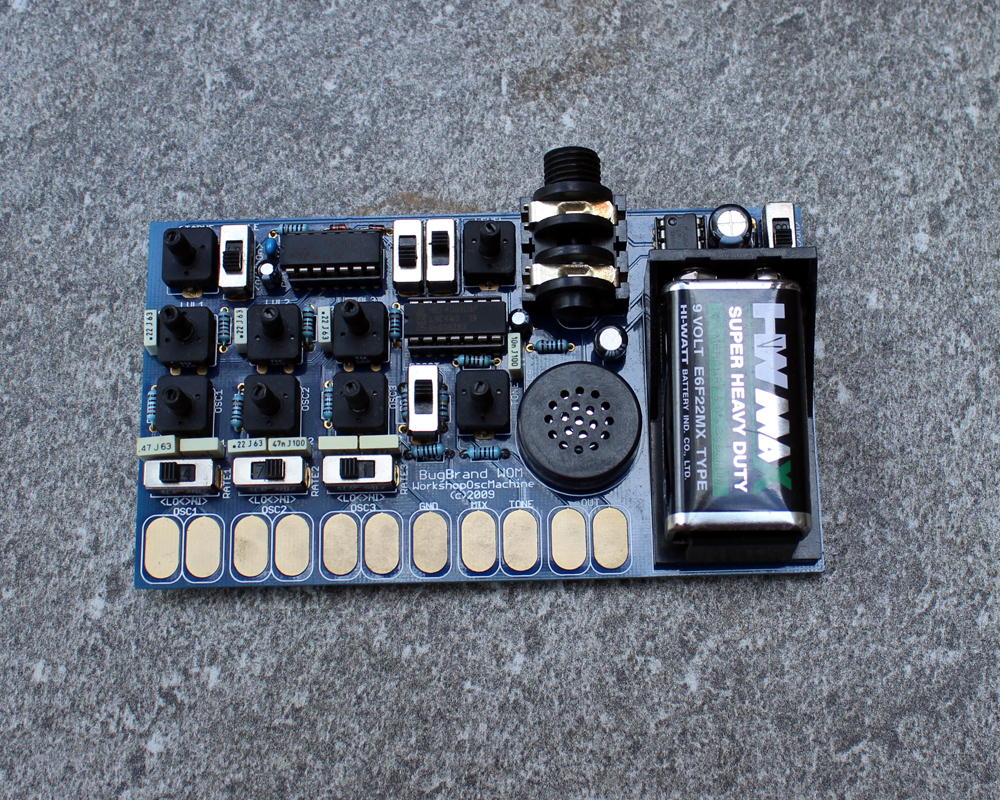
WOM
Another one from Tom. The WOM, Workshop Osc Machine, three oscillators plus body contacts to alter the sounds and a mixer. Fun.
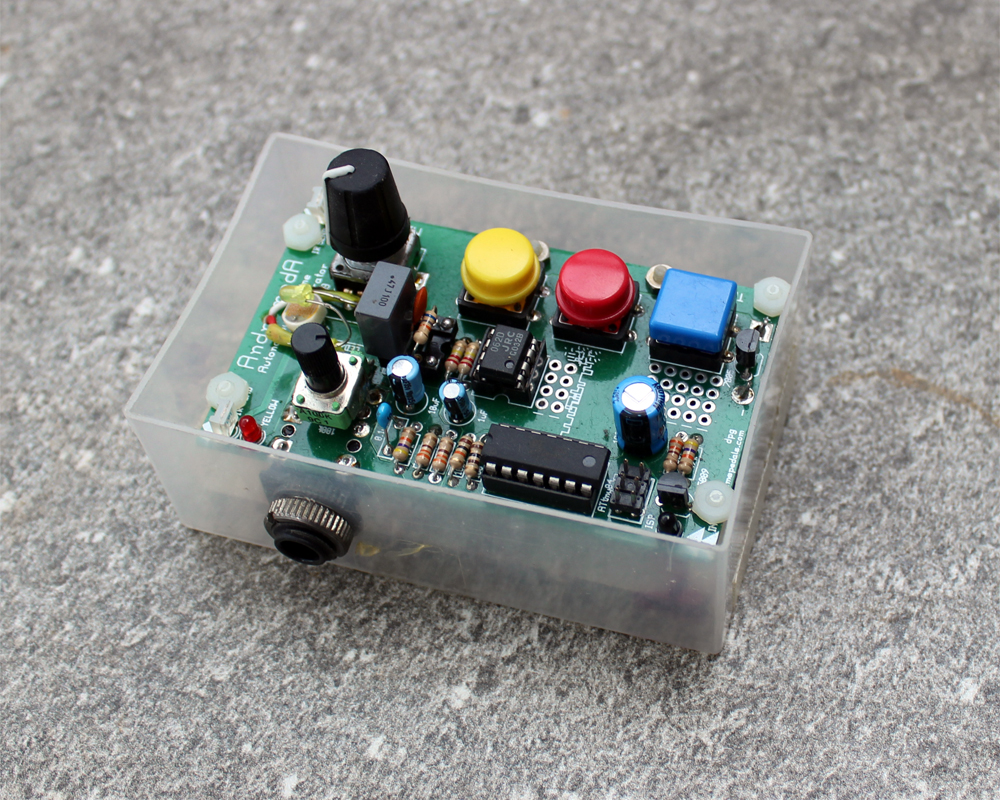
Auto Bass Generator
A weird kit thing, this time from Commonsound in Texas. Left to run by itself it plays a programmed but continuously changing synthy bassline, but you can also play it to some extent by changing pitch, speed and sounds. It features on Theme by Homosexual Death Drive.
Further into noise and fuzz
At the same time as I was making low-tech electronic drone things, I rediscovered fuzz and got more into vintage stuff.
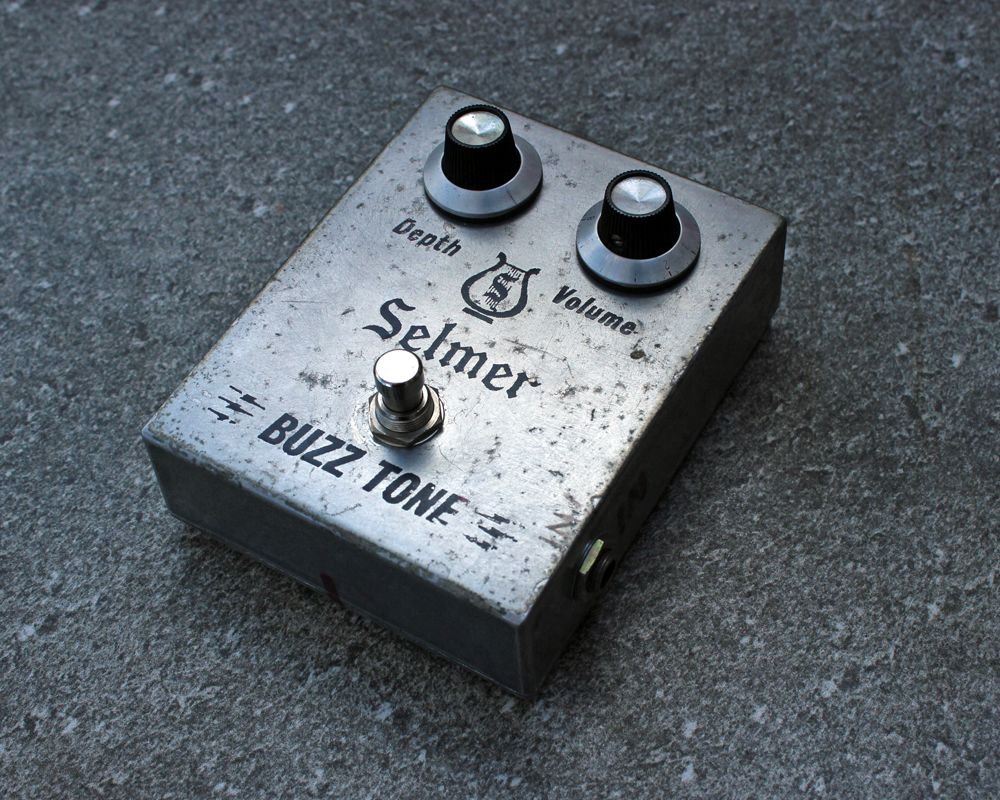
Selmer Buzz Tone
Most 1960s amp manufacturers also made pedals. This is a clone of Selmer’s only fuzz, though it’s not very fuzzy. I used blue ‘press-n-peel’ paper to transfer the graphic to the box.
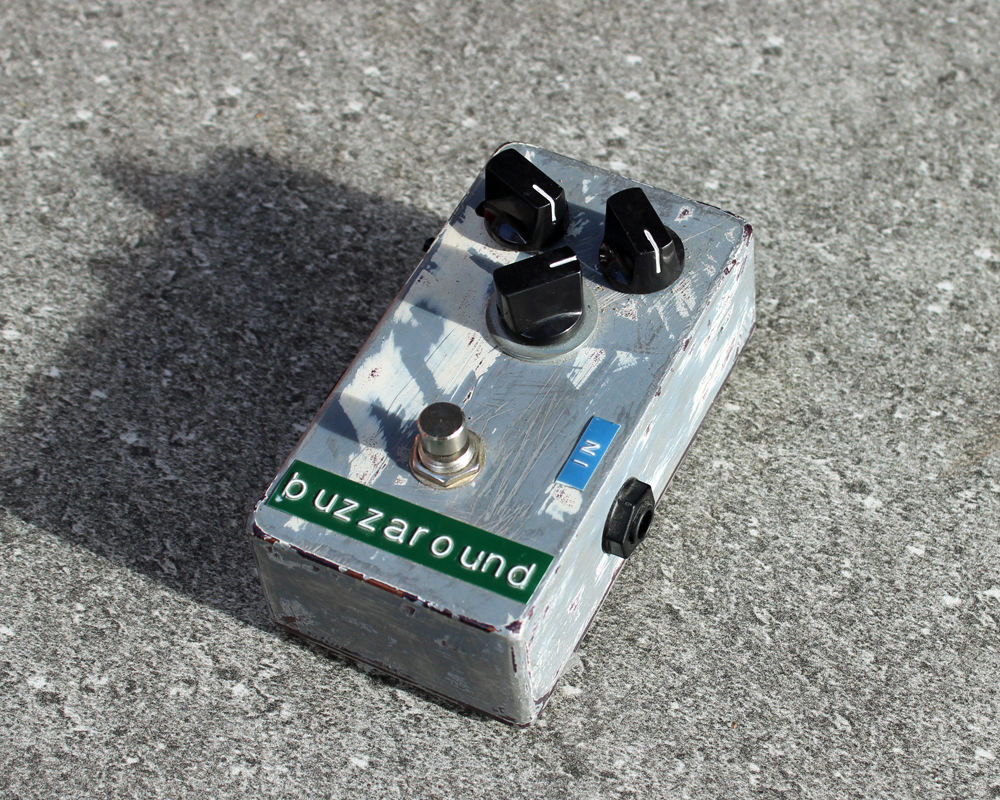
Buzzaround
As a participant on the Freestompboxes forum I played a small part in unlocking the secrets of the Burns Buzzaround around 2008 and made my own one at that time. It was (is) amazing, it’s the circuit that really set me up in germanium fuzz land and introduced me to the D*A*M forum.
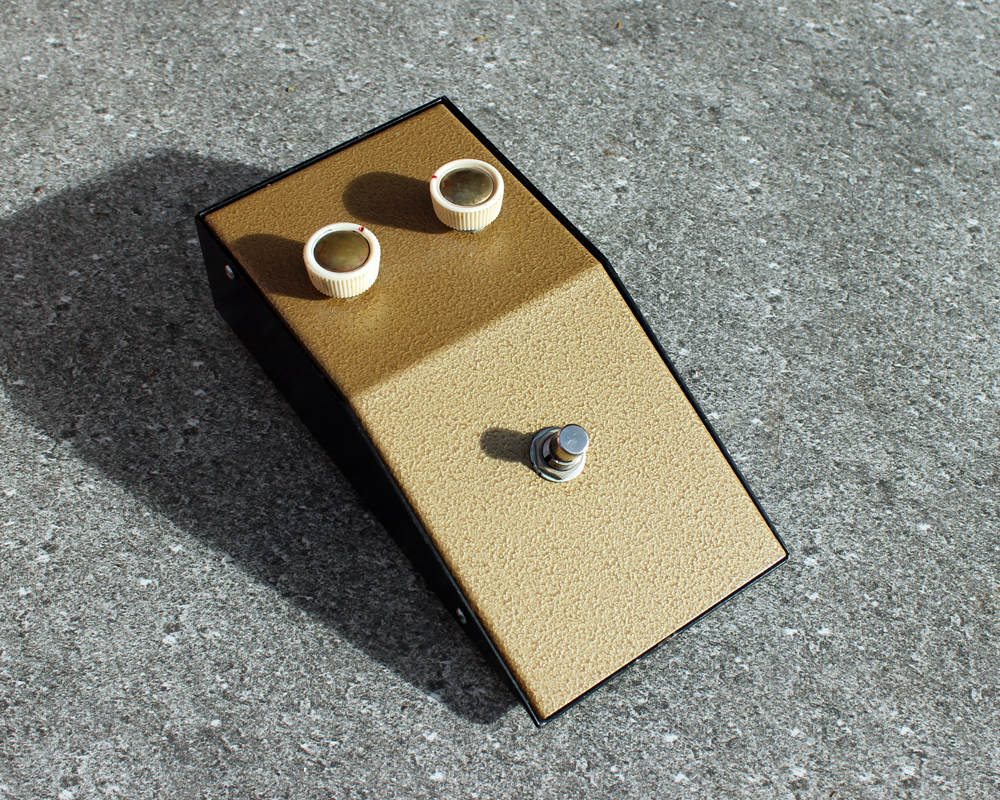
Mk1 Tone Bender
If the Buzzaround was the gateway drug, the Mk1 Tone Bender was the rabbit hole, to mix fuzzy metaphors. At this time the fabled Texas Instruments 2G381 transistor was still available, and OC75s were cheap. I couldn’t believe how great it sounded and still sounds. This and my D*A*M 1965 are the benchmarks of what constitutes a Good Fuzzy Sound.
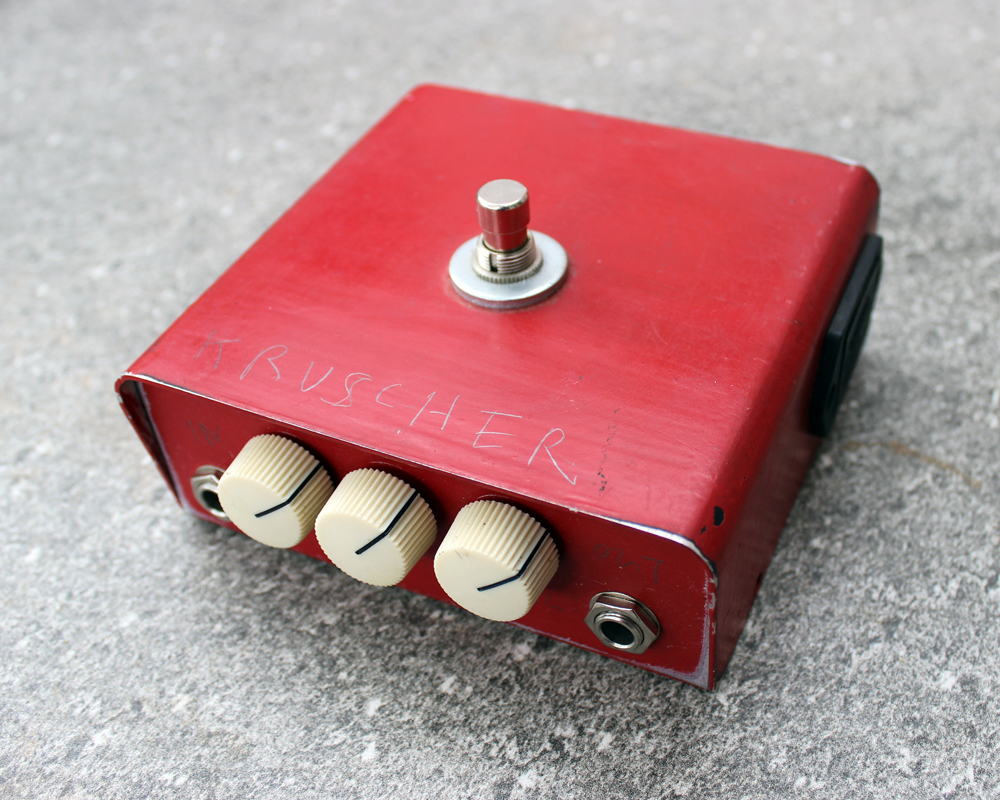
The Kruscher
This could have been the first Good Fuzzy Sounds pedal, more that 10 years ago, but I lost my nerve. A Mk1 Tone Bender with a twist: a modified circuit with an extra knob and Soviet era Russian transistors. I spent ages on the design and found some nice enclosures, but somehow I never went into production.
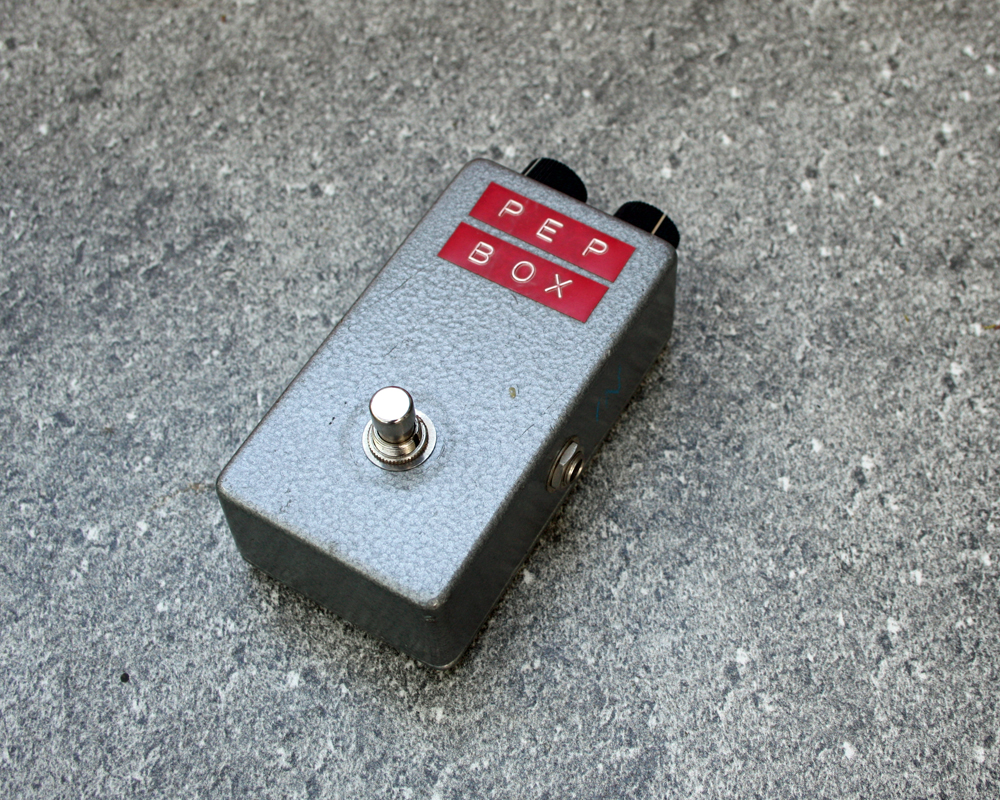
Pep Box
Another mystery 1960s fuzz that was revealed to the world on the Freestompboxes forum around 2010. I also made an earlier pedal by the same builder, Pepe Rush. He contacted me through the Musical Den blog and I interviewed him for the Good Fuzzy Sounds zine. He died in 2018, but his daughter Lucy is keeping the flame alive.
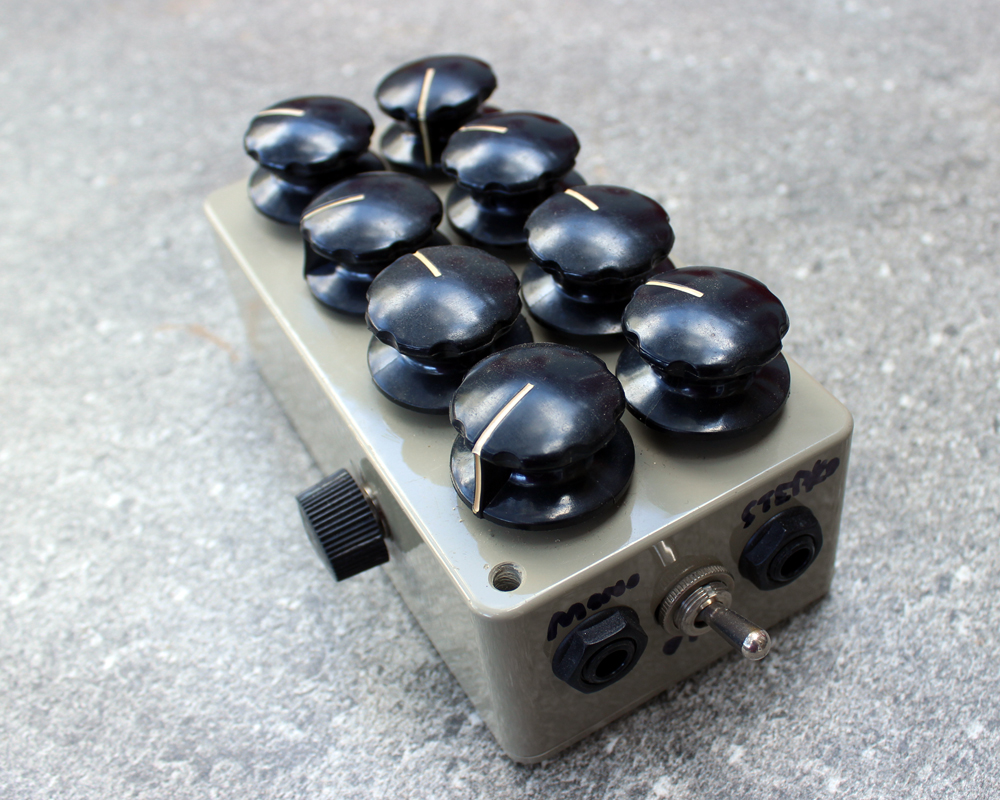
Quad Drone
This has two Duo Tone Party Time circuits which can operate in stereo or mixed to mono. I’ve recorded and performed solo with this, it’s fun and can go from subtle to evil very quickly. An early track features on The Monsters That Ate Uranus compilation.
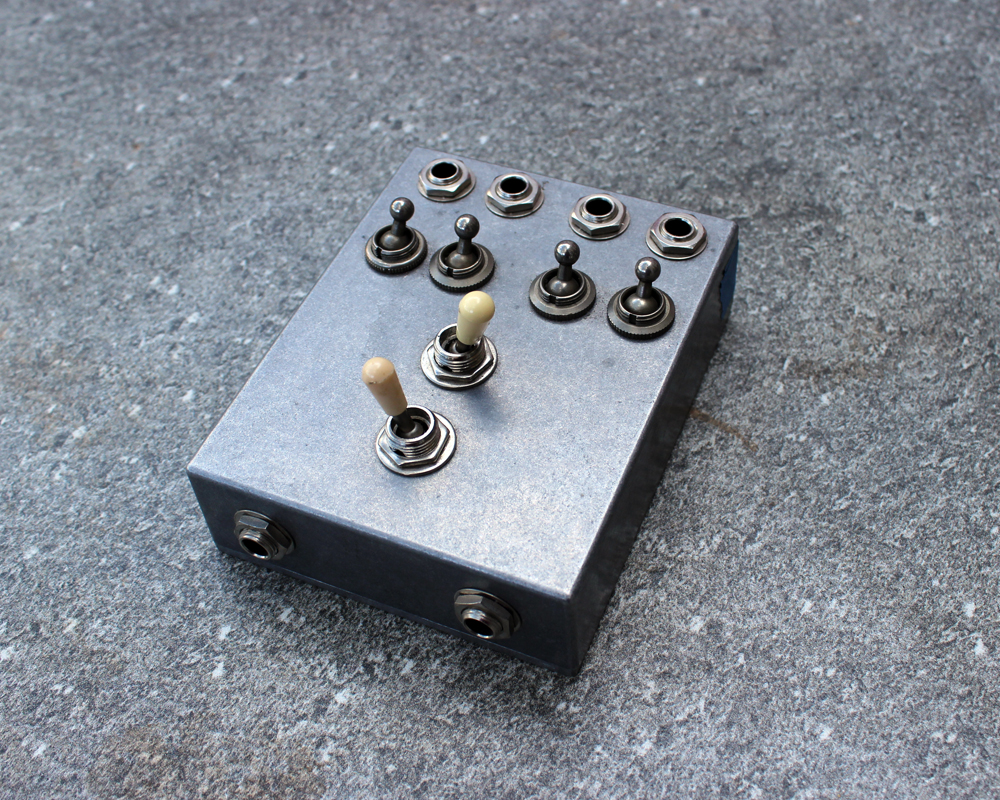
Signal Splitter
This is just an over-complicated box that I’ve used live. It splits the two stereo channels (from the Quad Drone) into two channels each (to go into different pedals), or the other way around; it mixes two pairs of signals down to two.
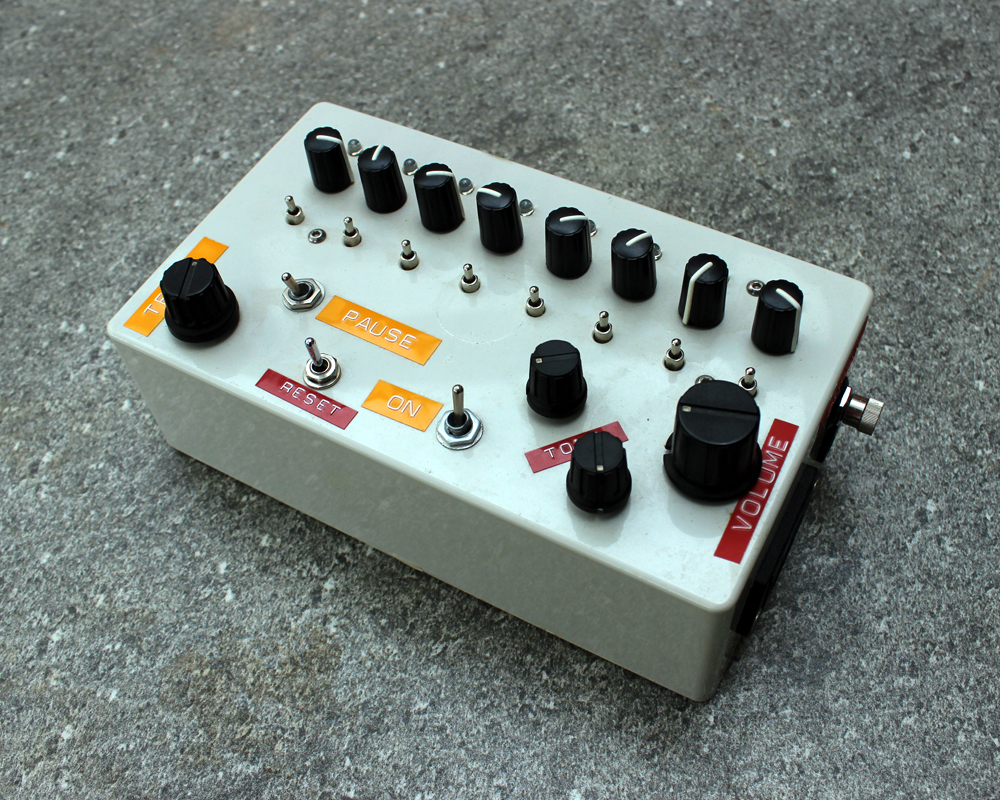
Synthrotek Sequencer
This is a simple 8-step sequencer I built from a kit that interacts with yet another version of the Party Time circuit. I built this for Charlotte to experiment with and/or use with Homosexual Death Drive.
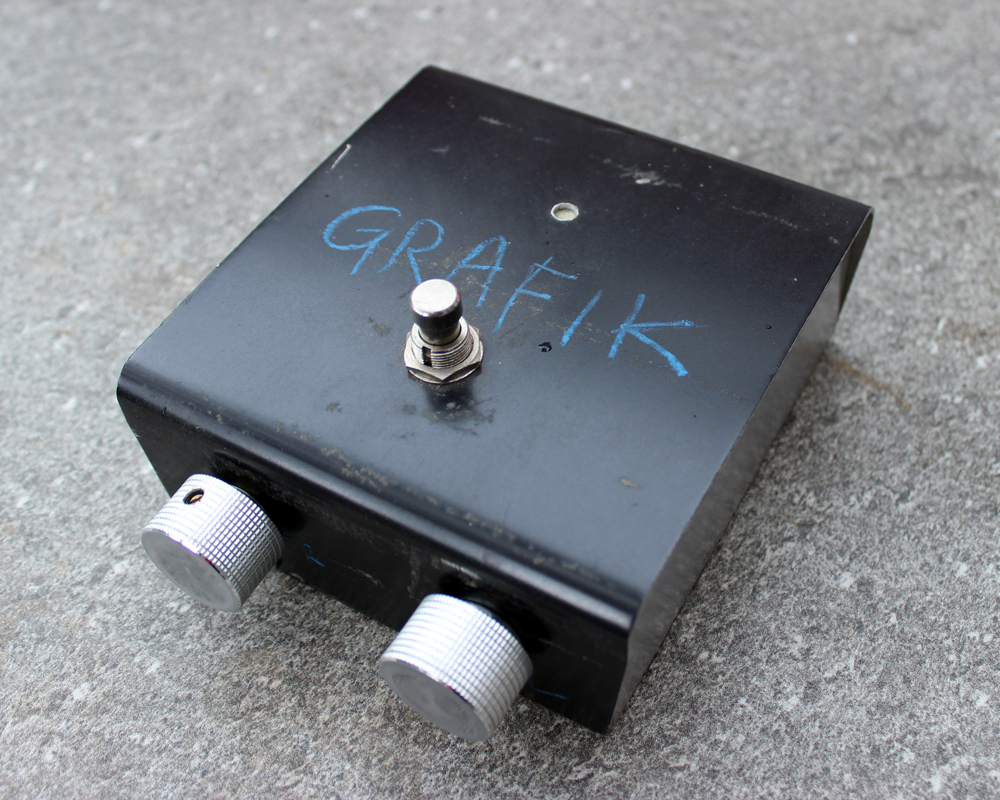
Grafik Fuzz
Prototype clone of the Earth Sounds Research Graphic Fuzz, which is an odd 1970s op-amp fuzz that I like a lot. This was another one I was going to make under the Good Fuzzy Sounds name, but lost interest in, though I have all the parts to make a replica/clone.
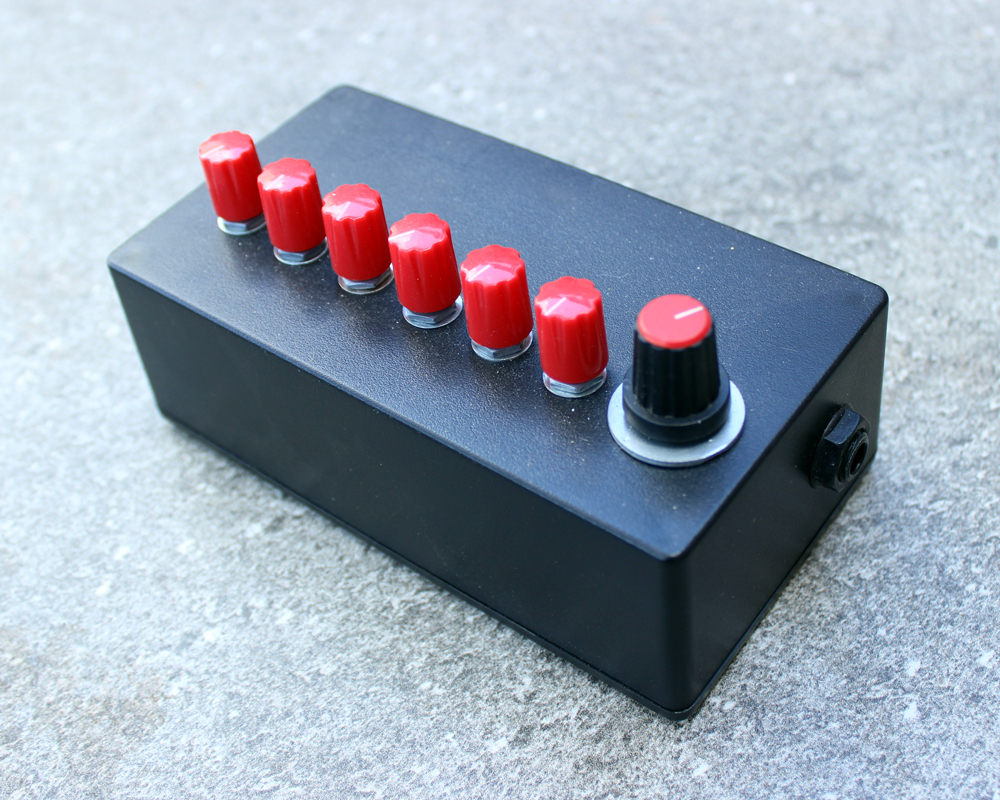
Hexdrone
This was built around 2019, from a kit off eBay, just for fun. It’s a more refined take on the Quad Drone, this time with six separate voices.
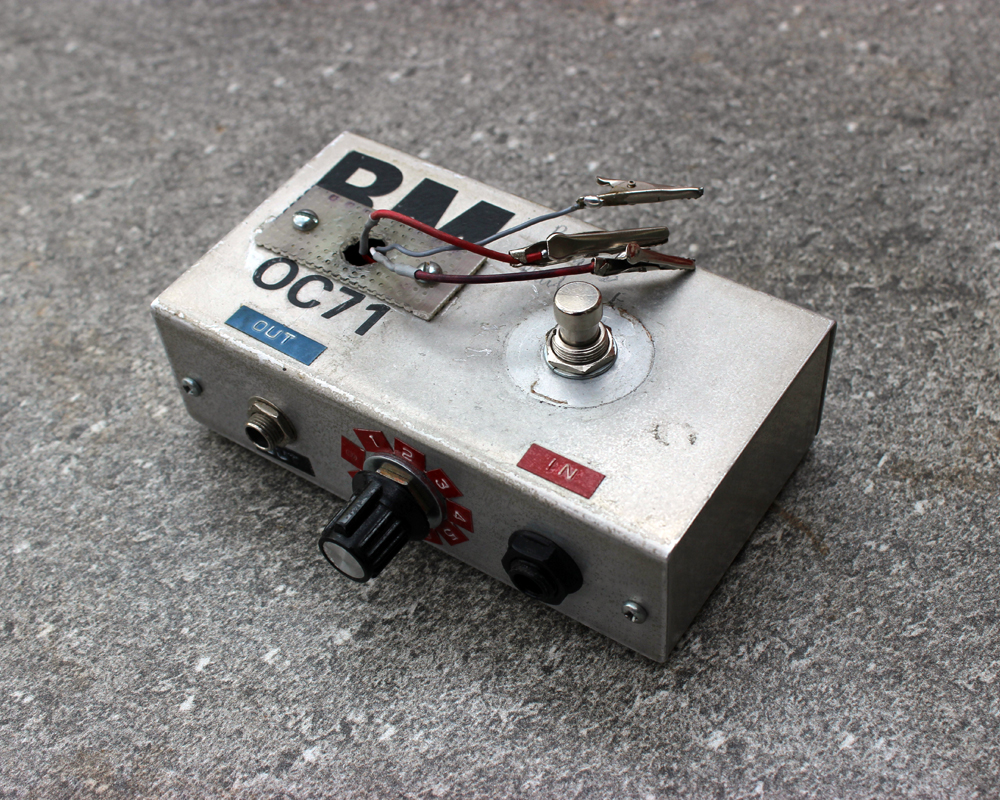
OC71 Tester
This was a Rangemaster I built in 2003 but I’ve re-jigged it as a tester for OC71-type transistors, like the ones in the Bad Nite.
